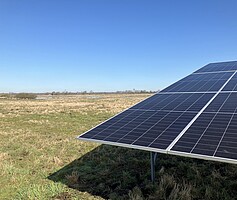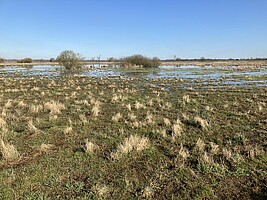MoorPower
Sustainable and innovative photovoltaic solutions for rewetted peatlands


Status: Ongoing
Project Start: 01.12.2024
Project End: 30.06.2028
Keywords:
Peatland Photovoltaics (Peatland PV), Electricity Generation, Rewetting, Paludiculture, Paludi PV, Climate Protection, Energy Transition, Land Use, Peatland Protection
Description
Peatland photovoltaics (peatland PV) is a concept that combines the rewetting of formerly drained, heavily degraded peatlands with the use of these areas to generate electricity via ground-mounted photovoltaic systems. This dual use could help to reduce greenhouse gas emissions, thereby contributing to climate protection, while also making rewetting more economically appealing to agricultural businesses and potentially alleviating land use competition in Germany. Additional agricultural land use can be established through the cultivation of paludiculture crops such as cattails and reeds (Paludi PV) for the production of renewable resources. However, the combined scientific investigation of ground-mounted PV and peatland rewetting, with or without paludiculture, is lacking. The overarching goal of the joint project MoorPower is therefore to research the ecological, socio-economic, technical, and legal matters of peatland PV and Paludi PV comprehensively, and to derive recommendations for the concrete implementation in Germany based on this research.
As upland moors and fens are typically open habitats with little or no shrub or tree vegetation, significant shading effects from PV modules on vegetation development, and thus on biomass growth and peat formation potential, are to be expected. Against this background, the Plant Ecology Department at the University of Hohenheim is conducting gradient experiments in mesocosms to investigate the effects of shading and therefore reduced light availability on plant species that are relevant for the rewetting of peatlands and for paludiculture. In cooperation with the Fraunhofer ISE, these experiments will be validated under real-world conditions using various PV system configurations.
Participants
Andreas Schweiger (andreas.schweiger@uni-hohenheim.de)
Natalie Palm (natalie.palm@uni-hohenheim.de)
Project Partners
Universität Greifswald, Fraunhofer ISE, Johann Heinrich von Thünen-Institut, Hochschule Kehl
Funder
Federal Ministry for Research, Technology and Space (BMBF)
